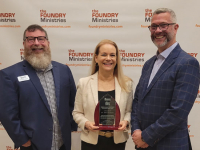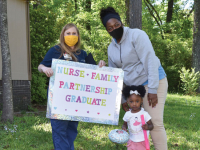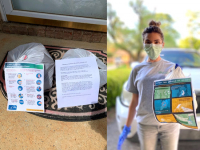 Candace Knight, PhD, RN, stands with a Nurse-Family Partnership client on a visit.With more than $150,000 in additional funding from the state of Alabama and Maternal, Infant and Early Childhood Home Visiting (MIECHV) program funds, the Nurse-Family Partnership of Central Alabama is expanding to include additional nurse-home visitors, another county in its service area and much-needed mental health services for at-risk clients.
Candace Knight, PhD, RN, stands with a Nurse-Family Partnership client on a visit.With more than $150,000 in additional funding from the state of Alabama and Maternal, Infant and Early Childhood Home Visiting (MIECHV) program funds, the Nurse-Family Partnership of Central Alabama is expanding to include additional nurse-home visitors, another county in its service area and much-needed mental health services for at-risk clients.
The Nurse-Family Partnership of Central Alabama, administered by the UAB School of Nursing, works with low-income, first-time mothers-to-be at home to help guide behavioral changes needed to improve the health and welfare of the mother and child in an effort to improve infant mortality rates in Alabama. It focuses on first-time mothers because it is during a first pregnancy that the best chance exists to promote and teach positive and enduring behaviors between a mother and her baby, including getting prenatal care from their health care providers, improving their diet, and reducing their use of cigarettes, alcohol and illegal substances. They also will look to improve child health and development by helping parents provide responsible and competent care, as well as improve the economic self-sufficiency of the family by helping parents develop a vision for their own future, plan future pregnancies, continue their education and prepare to find work.
And the mental health of the mothers is key to the success of these behavior changes.
“A lot of the mothers we work with have high screening scores for depression and anxiety, and have experienced significant trauma in their lives. While all of our nurse home visitors have a general understanding of mental health care, we wanted to bring on someone with more expertise in mental health,” said Candace Knight, PhD, RN, assistant professor and Nurse-Family Partnership program director.
In addition to adding three more nurses to be able to serve more clients and expanding to Walker County in north-central Alabama, Assistant Professor Karmie Johnson, DNP, CRNP, PMHNP-BC (MSN 2011, DNP 2016) now joins nurse home visitors when they see clients to provide mental health care services to those who are at risk.All mothers are screened for anxiety and depression during pregnancy, post-partum, and key intervals throughout the program, Knight said, and about 16 percent report moderate to extreme depression and 24 percent report moderate to severe anxiety. Nurse home visitors ask individuals with high screening scores if Johnson can come to a future visit.
The opportunity is a great fit, Johnson said, because she enjoys working with the population helped through NFP.
“My background is in behavioral health with adolescents that faced early childhood trauma or other mental health issues. For this group, there can be a lot of barriers to getting supportive care for their depression and anxiety, so entering their homes is a great first step,” Johnson said.
Some of the clients she sees have previously interacted with mental health, Johnson said, but that care may have been mandatory or the goal of those interactions was different than their current situation, so understanding barriers and reluctance and listening to concerns is an important part of establishing trust with the women. Karmie Johnson, DNP, CRNP, PMHNP-BC
Karmie Johnson, DNP, CRNP, PMHNP-BC
“On the first few visits, it’s building rapport and letting them direct the conversation,” Johnson said. “The key is being open and entering the relationship without an agenda. We start small and build trust with these clients, and hopefully they can emerge able to advocate for themselves.”
One issue Johnson regularly encounters with clients is the stigma surrounding “mental health.” Instead of using that terminology, she talks with them about emotional wellness and emphasizes that it is OK to talk about those concerns during and after pregnancy.
“A lot of clients say, ‘I don’t want to see anybody. I’m not crazy.’ But there is such a wide spectrum of mental health, so I explain everyone gets anxious and everyone gets depressed, especially when you’re having this huge, life-changing event,” Johnson said. “The goal for anything we do in mental health is insight — do you have the insight to say, ‘This is affecting me, and I need to reach out.’ That’s where I want our clients to be.”
Johnson also helps with goal setting, monitoring emotional needs and other processes in the realm of emotional wellness. It’s a way to improve the health of a community, Johnson said, because women’s health is everyone’s health.
“Helping our clients with depression and anxiety is a good next step toward meeting their goals. Mental health is a big barrier for some of our clients, and this can help them find and keep a job, take care of themselves and hopefully advocate for themselves as well,” Knight said. “Karmie can help make that mountain in front of them just a little bit smaller and help them get where they want to be and be the best mom they can be.”






















































































